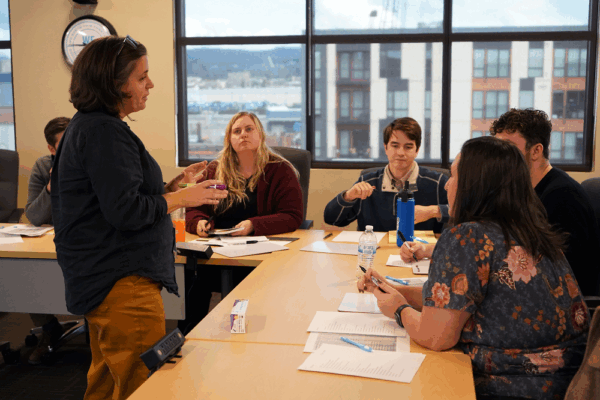WECU ($3.0B, Bellingham, WA) is using language training to better engage with Spanish-speaking consumers as the credit union expands its reach.
Did You Know?
Whatcom County, WA, where WECU is based, is roughly 11% Hispanic and Latino. Neighboring Skagit County hosts a Spanish-speaking population nearly twice that size.
The industry has long viewed Spanish speakers as a key growth market, with many credit unions deploying Spanish-language chatbots, earning Juntos Avanzamos certification, and more. Despite such efforts, a 2024 study found nearly one in 10 Hispanic households in the United States were unbanked, with the demographic comprising slightly more than one-third of the nation’s unbanked population.
“Our primary goal was to support our staff who wanted to acquire the Spanish skills needed to better support our Spanish-speaking members, especially as our Spanish-speaking membership grows,” says Cindy Klein, WECU’s chief human resources officer.
Klein worked alongside Kelly Helms, WECU’s director of learning and development, to explore e-learning options through vendors, Duolingo, and more, but none of the options he looked into seemed right for the credit union, in part due to a lack of customization.
2 Tracks, 1 Goal
The “a ha!” moment came when Helms realized he regularly plays basketball with a Spanish professor at Western Washington University. That connection presented the opportunity for a partnership with WWU, which provides employee language training through its outreach and continuing education program.
The program offers two tracks, basic and advanced, depending on the employee’s fluency. So far 40 staffers, or about 35% of the credit union’s member-facing retail staff, have paired up with Spanish instructors and tutors from WWU for four 90-minute sessions across four weeks.

Basic training is for staff with no previous Spanish speaking experience. It includes greetings and basic financial services vocabulary, such as terms for savings account, check, loan, and more. Advanced training is for employees who possess conversational Spanish skills but want to deepen their ability to discuss more complex financial concepts, such as explaining credit or dealing with fraud.
“With basic, we want you to be able to recognize key words and phrases in Spanish, such as, ‘Open a checking account,’ ‘make a deposit,’ or ‘cash a check,’” Helms says. “We’re not asking you to be fluent or conversational, just recognize what a Spanish-speaking member’s needs may be.”
Instructors conduct the entry-level curriculum in English, whereas advanced training is entirely in Spanish, with English only used for clarification as needed. Notably, both tracks are free to the credit union thanks to a job skills grant from the state of Washington that supports organizations looking to develop employee skills.
Helms and other WECU leaders worked hand in hand with WWU staff to develop the curriculum, and the team meets on a monthly basis to make tweaks as needed. All training is in person, although the credit union is developing an e-learning module, as well.
The courses are taught by WWU undergraduates majoring in Spanish, who work closely with faculty advisors within their department to ensure they know how to teach more specialized language like financial services.
While the continuing education and language departments have worked in non-classroom settings before, the banking aspect is a new experience for everyone, says Andrew Blick, a director of outreach and continuing education at WWU. The partnership has been a two-way street.
“The students are being exposed to more of those financial literacy ideas, and it transfers across languages within the workshops,” he says.
New Skills For Better Service
For now, instruction is available only to member-facing retail staff, including front-line staff and the contact center. Although the credit union is focusing on areas most likely to encounter Spanish speakers, it might eventually make training available for employees in business banking or mortgage lending.
To kick off the program, retail leaders across the organization nominated participants. Of these, 40 employees have joined so far, with 25 on the basic track and another 15 on the advanced track. Perhaps surprisingly, employees in the contact center have shown lighter interest; according to Helms, that is in part because of how easy it is to connect callers to a translator.

WECU isn’t formally tracking employee progress or program impact beyond logging who takes part in the training, but Helms says anecdotal evidence indicates the program has been a success. After all, it has helped the credit union fulfill not only an organization goal of entering new markets but also an organizational value of doing the right thing.
“If we have Spanish-speaking members, doing what’s right means equipping our staff to fully support and serve those members,” the learning and development director says.
The program also has helped WECU increase its efforts toward inclusion and belonging, and prepared the credit union for broader demographic changes taking place nationwide.
“We know Spanish language is growing across the United States,” Helms says. “We want to be ready for those changes as Spanish-speaking populations grow in our region.”
A Little Goes A Long Way
Employees at WECU are interested in finding new ways to support member needs. Members, in turn, see and appreciate the effort.
“Members are so happy when our staff members try to understand Spanish,” Helms says. “They’ve shown an appreciation for our additional attempt to converse in Spanish. And they’ve enjoyed helping our more basic Spanish speakers with pronunciation tips.”
It’s been a win-win for WWU, as well.
“It’s a really nice way for students to get involved with the community,” says Blick. “We’ve seen a lot of reciprocal learning on campus with this program.”
The experience has also reinforced that credit unions can forge partnerships in unexpected places to fill members’ needs that aren’t being met.
“Find where the biggest area of need is and develop a program that can support staff and members in that area,” Helms advises. “Then get started. Once we got the ball rolling, we saw how much excitement there was internally and with our partners.”
Your Next Great Idea Is A Webinar Away. Build off the insights of industry experts and take your credit union to the next level. Callahan Webinars show you how, and with a robust library of archived events and multiple live webinars each month, there is no shortage of valuable ideas at your fingertips. Learn how to attract members, develop employees, and more. Don’t miss out — click here to gain access.
